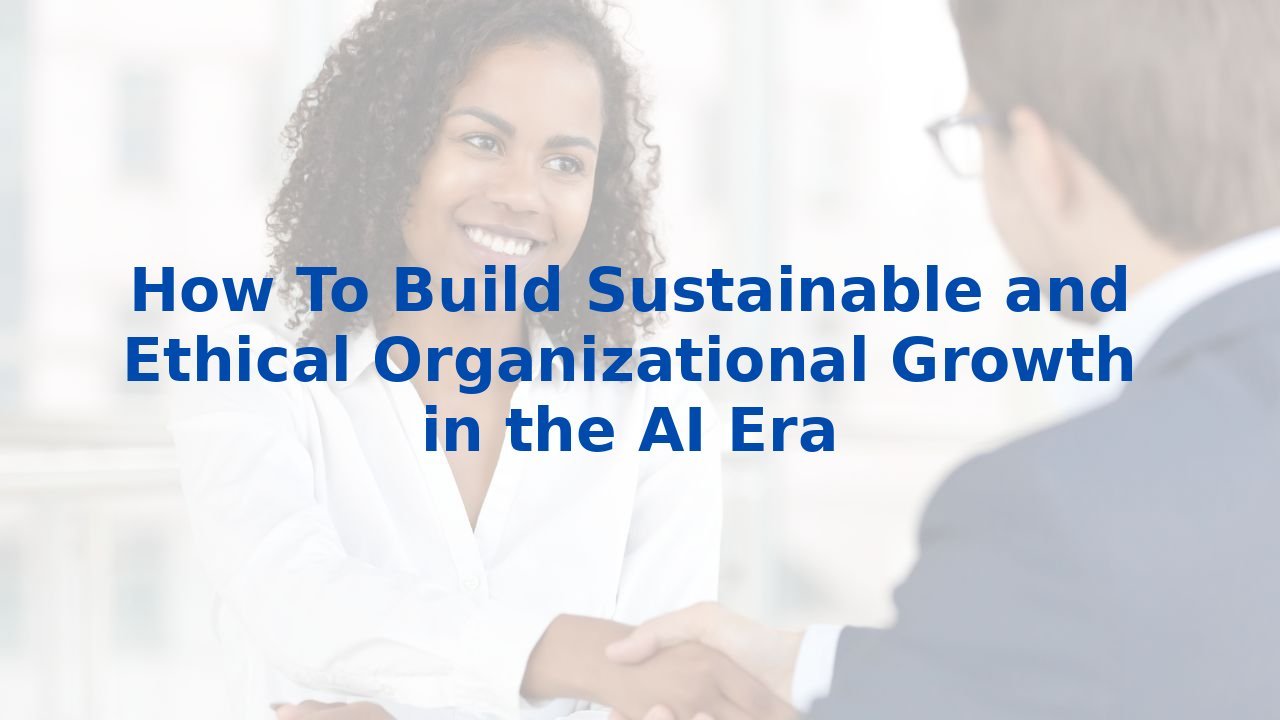How To Build Sustainable and Ethical Organizational Growth in the AI Era
How To Build Sustainable and Ethical Organizational Growth in the AI Era
In an era where technology is evolving at a breakneck speed, the integration of Artificial Intelligence (AI) into organizational processes is no longer a choice but a necessity. However, with great power comes great responsibility. The path to growth must be paved with ethical considerations and sustainable practices—elements that are essential for businesses aiming to thrive in the AI-driven landscape.
The Importance of Sustainability in AI
Sustainability is not just a buzzword; it has become a vital aspect of business strategy in the age of AI. As organizations harness technology's power to drive growth, they must also consider the broader implications of their actions on the environment and society. This includes adopting practices that do not deplete resources or widen socio-economic disparities.
Embracing sustainable practices helps businesses align their growth with long-term success. By prioritizing sustainability, companies can enhance their brand reputation, attract socially conscious consumers, and contribute positively to global challenges. Businesses must understand that growth in today's world is increasingly linked to sustainability, pushing them to adopt strategies that respect environmental limits while maximizing resource efficiency.
Ethical Integration of AI
As the engine driving many modern processes, AI’s ethical integration is critical in fostering a responsible organizational culture. Companies must establish clear standards and guidelines that govern AI usage, ensuring fairness, transparency, and accountability in their decision-making. An organization grounded in strong ethical principles creates a moral compass that guides its operations, minimizing the chances of navigating into murky waters where AI might be misused or exploited.
“An ethical framework is not a limitation; it’s a powerful enabler for innovation.”
Enhancing Efficiency with AI
One of the most compelling advantages of integrating AI into business processes is the enhanced efficiency it offers. By automating repetitive tasks, improving data analysis, and optimizing workflows, AI can streamline operations across the board. For instance, AI can significantly minimize carbon footprints by optimizing energy consumption and effectively allocating resources.
Moreover, AI can be used to drive diversity and inclusion within organizations. By analyzing hiring trends and employee engagement metrics, AI can help businesses create a more equitable workplace, a crucial element of sustainability in the contemporary corporate environment.
The Role of Employee Training
To unlock the full potential of AI, organizations must invest in employee training. As AI becomes more integrated into daily operations, employees must be equipped with the necessary skills to interact with these systems effectively. Understanding AI ethics, data privacy, and responsible AI practices can empower employees to leverage technology in alignment with the organization's objectives and values.
By investing in comprehensive AI training programs, organizations can cultivate a workforce adept at utilizing AI for ethical decision-making and optimized operations. Such training not only enhances individual capabilities but also fortifies the organization’s overall ethical framework, creating a mature, responsible approach to AI integration.
Real-World Applications
Real-world case studies exemplify how organizations have successfully woven these strategies into their operational fabric. Businesses that have effectively integrated AI into their processes often report substantial efficiency gains and heightened sustainability measures. Whether it’s optimizing resource allocation to minimize waste or employing AI in the development of renewable energy solutions, these companies are at the forefront of sustainable innovation.
These initiatives not only serve the environment but also enhance the organization's overall reputation, reaffirming their commitment to corporate responsibility in an increasingly aware marketplace.
Conclusion
Building sustainable and ethical organizational growth in the AI era is not a linear journey but a multi-dimensional endeavor. Organizations that prioritize sustainability, ethical AI integration, and comprehensive employee training are better positioned to harness the power of AI for meaningful growth.
As we navigate this technological evolution, it is imperative for companies to consciously develop strategies that drive business outcomes while positively impacting the environment and society. The future belongs to those who align their ambitions with the principles of sustainability and ethics, paving the way for genuine, responsible growth.
For organizations looking to equip their entire workforce with AI skills, explore custom training solutions that fit your specific needs to drive growth responsibly and sustainably.



